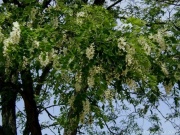Black locust
Description
A small deciduous tree, Robinia pseudoacacia, native to the Appalachian and Ozark Mountains of the United States. The black locust tree produces hard, tough wood used for outdoor construction, fence posts, and mine timbers. The tree is often planted along European streets because it is pretty and tolerates pollution well.
Synonyms and Related Terms
black locust (Robinia pseudoacacia); Gewöhnliche Robinie (Deut.); Falsche Akazie (Deut.); Silberregen (Deut.); robinier (Fr.); robinia (It.); falsa acacia (It.); robinia (Ned.); valse acacia (Ned., Port.); Robinia akacjowa (Pol.); false acacia; yellow locust
Other Properties
Medium tree growing to 15-25 m Bark=thick, fibrous gray to brown color Leaves = alternate pinnate Flowers=fragrant white hanging cluster (10 cm long) in late spring. Fruit = pale brown flat pod containing kidney shaped beans; ripens in fall.
| Density | 55-65 ppcf |
|---|
Hazards and Safety
All parts of tree are considered toxic.
Additional Information
Schoch, W., Heller, I., Schweingruber, F.H., Kienast, F., 2004:Wood anatomy of central European Species: Locust,False Acacia, Robinia pseudoacacia L.
Authority
- G.S.Brady, Materials Handbook, McGraw-Hill Book Co., New York, 1971 Comment: p. 462
- F. H. Titmuss, Commercial Timbers of the World, The Technical Press Ltd., London, 1965 Comment: 55-65 ppcf
- Dictionary of Building Preservation, Ward Bucher, ed., John Wiley & Sons, Inc., New York City, 1996
- Website address 1 Comment: Virginia Tech Dendrology website at www.fw.vt.edu/dendro/dendrology/main.htm (accessed Oct. 8, 2005)
- Wikipedia, the free encyclopedia, at http://www.wikipedia.com Comment: http://en.wikipedia.org/wiki/Black_locust (Accessed Oct. 8, 2005)
- Random House, Webster's Encyclopedic Unabridged Dictionary of the English Language, Grammercy Book, New York, 1997
- The American Heritage Dictionary or Encarta, via Microsoft Bookshelf 98, Microsoft Corp., 1998
